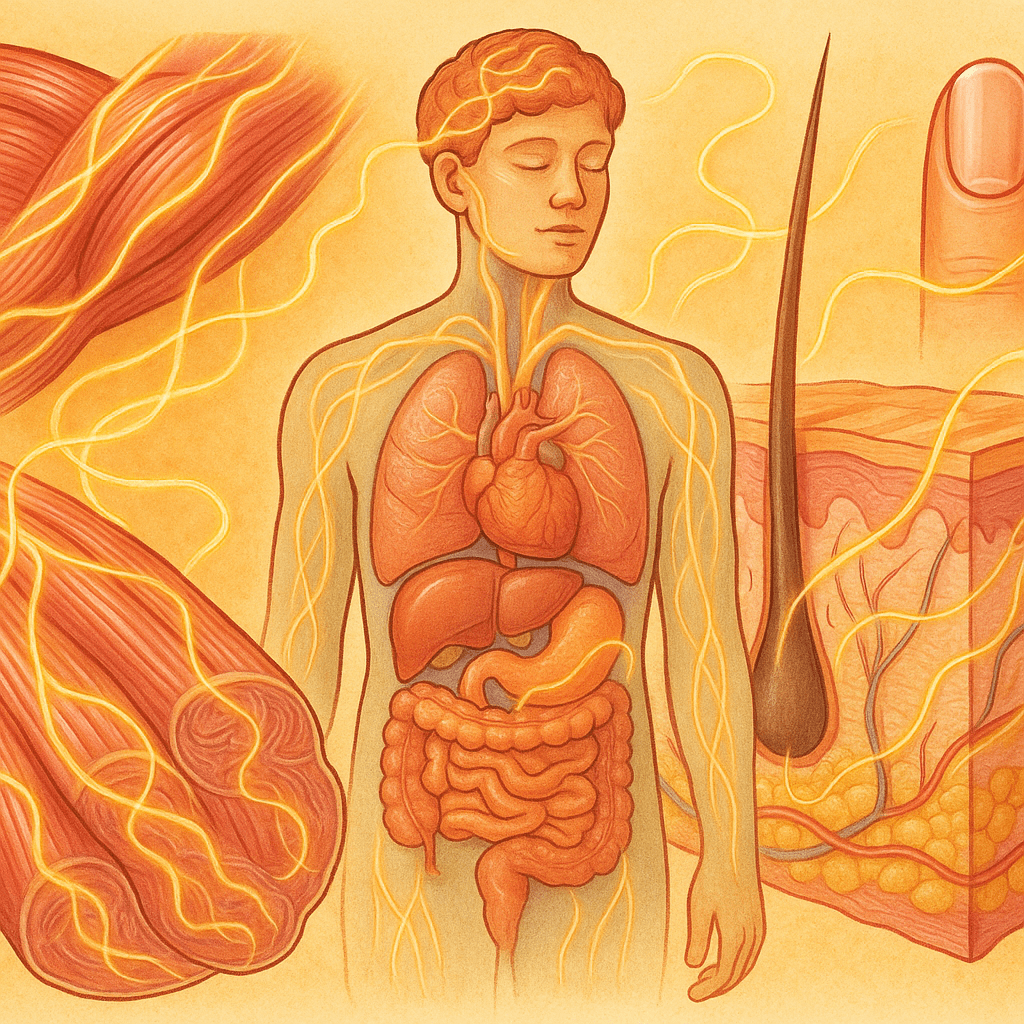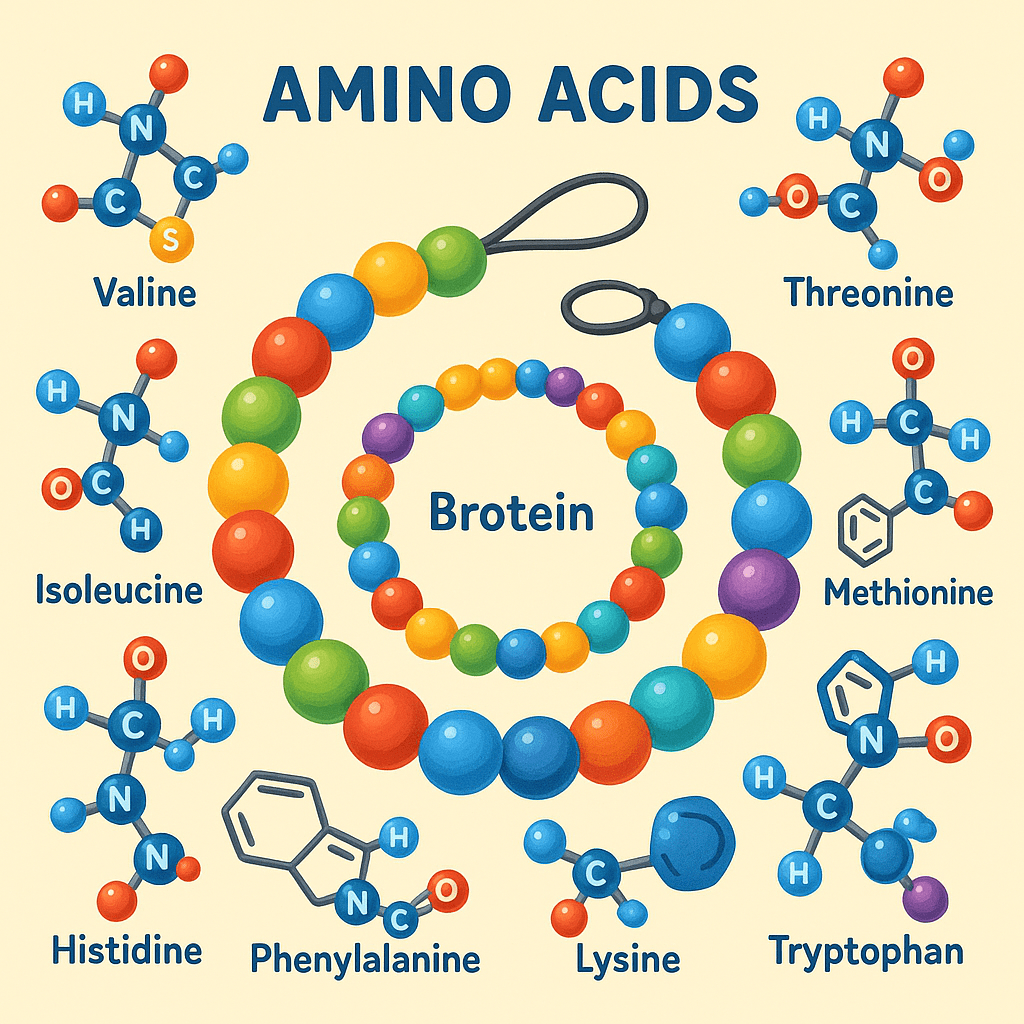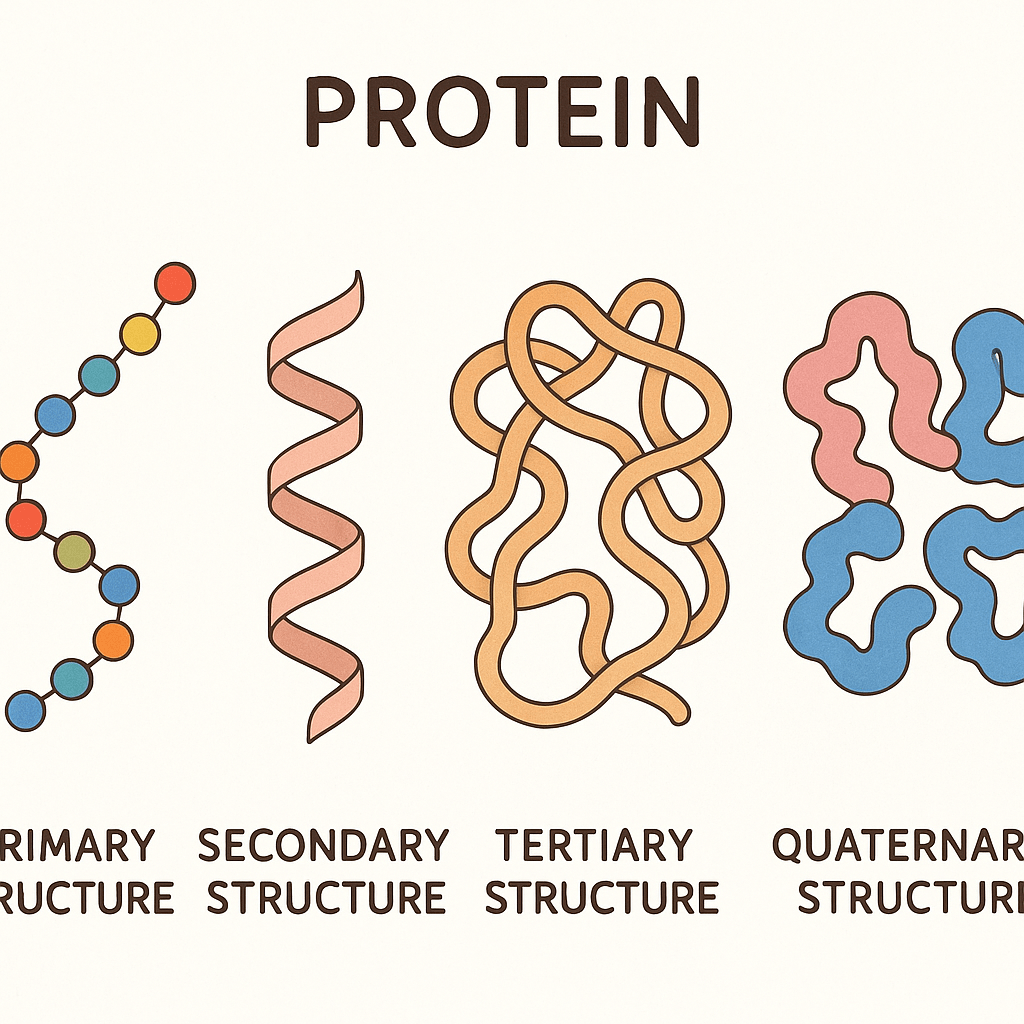Proteins are one of the essential building blocks of life, without which our bodies simply could not function. They are molecules that make up the body’s tissues, organs and muscles, and perform a multitude of vital functions. From muscle growth to supporting the immune system, from hormone production to transporting substances, these indispensable nutrients are involved everywhere. The importance of protein for muscle is undeniable, but many people still do not fully understand how much protein is needed and how it works in the body.
In this article, you will learn about the biological importance of proteins, their health benefits, daily requirements and the best sources. We will find out what the differences are between plant and animal proteins, discuss the most popular myths and answer the most frequently asked questions. This information will help you form a comprehensive view of the role of proteins in a healthy diet.
The biological role of proteins in the human body
Proteins perform a multitude of essential functions that support our body’s activities every day. They form the structure of our body and ensure that everything runs smoothly.
First of all, proteins are the main building blocks of tissues. They form muscles, skin, hair, nails, and internal organs.

Without adequate protein, our bodies would not be able to regenerate and grow. When tissue is damaged (for example, after an injury or intense exercise), proteins are essential for regeneration and repair.
Second, proteins function as enzymes – biological catalysts that speed up biochemical reactions in the body. Without enzymes, our digestion, metabolism and even DNA replication would be impossible or too slow to sustain life.
Third, proteins are the basis of the immune system. Antibodies that fight bacteria and viruses are made of protein. Proteins are also involved in blood clotting and help wounds heal.
Fourth, most hormones are of protein origin. Insulin, growth hormone and others regulate metabolism, growth and other important functions. Without these proteins, our body’s systems would not be able to communicate with each other.
Finally, proteins can be used as a source of energy, although this is not the optimal way to use them. The body primarily uses carbohydrates and fats for energy, but when these are in short supply, it can break down proteins.
Protein Structure and Amino Acids
Proteins are made up of smaller molecules called amino acids, which are linked together in long chains. Think of amino acids as beads and proteins as necklaces.

Each protein has a unique sequence of amino acids that determines its function.
Of the 20 amino acids, 9 are called essential because the human body cannot produce them – we must obtain them from food. The remaining 11 amino acids can be synthesized by the body itself. The essential amino acids are: histidine, isoleucine, leucine, lysine, methionine, phenylalanine, threonine, tryptophan and valine.
The quality of proteins depends on their amino acid composition. “Complete proteins” contain all the essential amino acids in the right proportions and are most often found in animal products. “Incomplete proteins” lack one or more essential amino acids and are more often found in plant products. However, by combining different plant protein sources (for example, grains with legumes), it is possible to obtain all the essential amino acids.
The molecular structure of proteins can be divided into four levels: primary (amino acid sequence), secondary (helical or folded structures), tertiary (three-dimensional shape of the molecule) and quaternary (interaction of several protein molecules). This complex structure allows proteins to perform specific functions in the body.
Benefits of protein for health and well-being
A sufficient amount of protein in the daily diet provides many benefits to our body. The importance of this substance extends not only to physical activity, but also to general health.
One of the main functions of protein is muscle growth and repair. After physical exertion, muscle tissue undergoes microtrauma, and protein helps to repair and strengthen it. For this reason, athletes and people who exercise actively often consume higher amounts of protein. Leucine – one of the most important amino acids for muscle synthesis – promotes the formation of new muscle tissue and helps prevent its loss.
Protein also helps control weight because it provides a feeling of satiety for a longer time compared to carbohydrates. When you eat protein-rich foods, your body releases hormones that signal your brain to reduce hunger. This can help you reduce your overall calorie intake and maintain a healthy body weight.
Bone strength and density also depend on adequate protein intake. While calcium and vitamin D are often emphasized when it comes to bone health, protein forms the matrix of bone tissue, where minerals are stored. Studies show that adequate protein intake helps prevent osteoporosis and reduces the risk of bone fractures, especially in older people.
Protein consumption can improve metabolism and energy levels. Digesting protein uses more energy than digesting carbohydrates or fats, a process called the thermogenic effect of food. In addition, amino acids are involved in many biochemical reactions that release energy from food.
Protein also plays an important role in healthy aging. As we age, our body’s ability to maintain muscle mass decreases, a process called sarcopenia. Higher protein intake can slow this process and help maintain functional capabilities. Protein also helps you recover faster from illness or surgery by speeding up tissue healing.
Certain populations have higher protein needs. Pregnant and lactating women need more protein because it is needed for fetal development and milk production. Athletes and active people also have higher needs due to increased muscle fiber damage and repair. Older people need more protein to compensate for the natural loss of muscle mass. Protein is also essential for those recovering from injuries or surgeries to help repair damaged tissues.
High-quality premium plant-based proteins are a great choice for those who want to get all the benefits of protein while avoiding animal products. Modern plant-based protein formulas provide all the essential amino acids needed for optimal body function.
How much protein do you need? Daily requirements and influencing factors
Protein requirements vary depending on many factors, but there are general recommendations that we can follow when shaping our diet.
The World Health Organization (WHO) and the European Food Safety Authority (EFSA) recommend an average of 0.8 g of protein per kilogram of body weight per day for healthy adults. This means that a person weighing 70 kg should consume at least 56 grams of protein per day, and a person weighing 90 kg should consume about 72 grams. However, these recommendations are minimal and are intended to prevent deficiency, but not to optimize health or athletic performance.
Physically active people and athletes are often recommended to consume 1.2-2.0 g of protein per kg of body weight. For example, a 70 kg athlete could aim for 84-140 g of protein per day. Endurance athletes generally need a lower amount (around 1.2-1.4 g/kg), while strength athletes need a higher amount (1.6-2.0 g/kg or more).
Age is another important factor. Older adults (over 65 years of age) are recommended to consume around 1.0-1.2 g/kg of protein to compensate for the reduced efficiency of muscle protein synthesis and maintain muscle mass. This is especially important in combating sarcopenia, the age-related loss of muscle mass and strength.
Vegetarians and vegans may also benefit from consuming slightly more protein (around 1.0-1.1 g/kg), as plant-based proteins are often not as easily absorbed as animal-based proteins. For this reason, this type of diet requires a more careful combination of foods.
It is important to note that pregnancy and breastfeeding increase protein needs. Pregnant women need an additional 25 g of protein per day, and breastfeeding women need an additional 20 g, especially in the first months of breastfeeding.
Protein deficiency can cause serious health problems: loss of muscle mass, a weakened immune system, deterioration of the skin and hair condition, slower wound healing and even edema (fluid accumulation). In extreme cases, kwashiorkor can develop – a severe form of protein deficiency, more common in developing countries.
On the other hand, excessive protein intake is not always beneficial. Although short-term increases in protein intake are usually not a problem for healthy people, long-term very high protein intake can increase the burden on the kidneys, especially in people with kidney disease. Also, according to some studies, very high animal protein intake may be associated with a higher risk of some diseases.
The distribution of protein throughout the day is also important. Research shows that for optimal muscle protein synthesis, it is better to consume protein evenly throughout the day rather than concentrating it in one meal. Ideally, each main meal should contain about 20-30 g of quality protein.
Interestingly, essential vitamins for immunity and protein often work synergistically, strengthening the body’s protective functions. For example, zinc and vitamin D, which are important for immunity, are better absorbed when consumed together with protein.
Protein Sources: Animal and Plant-Based Options
Protein can be obtained from a variety of foods, but its quality, absorption, and amino acid composition vary depending on the source.

It is important to know the main sources of protein and their characteristics in order to create a balanced diet.
Animal proteins are traditionally considered complete because they contain all the essential amino acids in the right proportions. Lean meats, especially poultry and fish, are excellent sources of protein that are low in saturated fat. 100 g of chicken breast contains about 31 g of protein, and 100 g of salmon contains about 25 g. Red meat is also rich in protein (100 g of beef contains about 26 g of protein) and iron, but its consumption is advised to be limited due to its higher saturated fat content.
Eggs are one of the most valuable sources of protein due to their amino acid profile, which is considered a benchmark. One large egg contains about 6-7 g of protein. Dairy products such as cottage cheese, Greek yogurt and cheese are also characterized by high protein quality. 100 g of cottage cheese contains about 12-14 g of protein, while 100 g of Greek yogurt contains about 10 g.
Whey protein, obtained as a by-product of milk processing, is very popular among athletes due to its rapid absorption and excellent amino acid composition. It is especially rich in leucine, which stimulates muscle protein synthesis.
Plant proteins have long been considered less valuable because many of them lack some essential amino acids. However, with the right combination of various plant protein sources, you can get all the necessary amino acids.
Legumes, such as lentils, beans and chickpeas, are some of the best sources of plant protein. 100 g of cooked lentils contain about 9 g of protein, and 100 g of chickpeas – about 8 g. Soy and its products (tofu, tempeh, edamame) are distinguished by being one of the few plant sources that contain all the essential amino acids. 100 g of tofu contains an average of 8 g of protein.
Nuts and seeds are also useful sources of protein, although they contain a lot of fat. 30 g of almonds contain about 6 g of protein, and 30 g of chia seeds contain about 5 g. Grains, especially quinoa, are valuable sources of protein. 100 g of cooked quinoa contains about 4-5 g of protein and all the essential amino acids.
An important principle of consuming plant proteins is their combination to obtain all the essential amino acids. A classic example is the combination of grains and legumes (rice with beans, bread with pea spread). In this way, the missing amino acid profiles are supplemented: grains are usually lacking in lysine, but have enough methionine, and legumes – vice versa.
Modern technologies have allowed the creation of high-quality plant-based protein supplements, which are an excellent alternative to animal proteins. Chocolate-flavored plant-based proteins are often made from a blend of pea, rice, hemp, or sunflower proteins, which provide a complete amino acid profile.
Choosing the Right Protein Supplement
There are many protein supplements on the market, so it’s important to know how to choose the right one for your needs. Whey protein is quickly absorbed and ideal for use after a workout. Casein protein is absorbed more slowly, so it’s suitable for use before bed or when you need a long-term supply of amino acids. Plant-based proteins are a great choice for vegetarians, vegans, and those who are intolerant to dairy products.
When choosing a protein supplement, it’s worth paying attention to its composition, amino acid profile, impurities, and additional ingredients. Some preparations contain a lot of sugar or artificial sweeteners, so you should choose products with a minimum amount of additional ingredients. It’s also important to pay attention to the supplement’s certifications and the manufacturer’s reputation to ensure the quality of the product.
Common Myths and FAQs About Protein
There are many myths and misconceptions about protein that can mislead people when forming their eating habits. Let’s take a look at the most common myths and their factual explanations.
One of the most popular myths is that “high protein intake is bad for the kidneys.” Research shows that for healthy people without kidney disease, higher protein intake does not pose a risk to kidney function. Healthy kidneys are able to handle the increased amount of nitrogenous compounds that are produced when protein is broken down. However, for people with existing kidney disease, protein can actually increase the workload on the kidneys, so they should consult their doctor about protein intake.
Another common myth is that “there is a maximum amount of protein that the body can absorb in one meal.” It is often stated that the body can only absorb 20-30 g of protein at a time, and the rest of the protein is simply wasted. However, studies show that while muscle protein synthesis can peak with 20-30 g of quality protein, the body still absorbs and uses the remaining protein for other purposes: energy, the formation of other tissues, hormone production, etc.
Myth #3 – “More protein always means more muscle.” While protein is essential for muscle growth, higher protein intake alone does not guarantee bigger muscles. Muscle growth requires adequate physical activity, a balanced diet, proper rest, and hormonal balance. Furthermore, once the optimal protein intake is reached (about 1.6-2.2 g/kg for active athletes), additional protein intake no longer provides additional benefits for muscle growth.
Another misconception is that “plant-based proteins are incomplete.” While many single plant sources do not actually contain all the essential amino acids in optimal proportions, by properly combining different plant-based protein sources, all the essential amino acids can be obtained. Additionally, some plant-based proteins, such as soy or quinoa, have a nearly complete amino acid profile.
It is also often believed that “protein consumption promotes bone loss.” This myth stems from old studies that showed increased urinary calcium excretion with high protein intake. However, more recent studies reveal that adequate protein intake is actually beneficial for bone health, as protein is a component of bone tissue and helps improve calcium absorption. Only very high levels of animal protein can have a negative effect.
It is also important to dispel the myth that “protein supplements are healthier than natural food sources.” While supplements can be convenient and effective, they should not replace a varied and balanced diet. Natural protein sources also usually contain other important nutrients: vitamins, minerals, fiber, and phytochemicals, which are often lacking in supplements.
It is also worth noting that protein helps maintain a healthy body weight not only because it keeps you feeling fuller for longer, but also because of its thermogenic effect – the body uses more energy to digest protein than carbohydrates or fats.
In conclusion, it is important to rely on scientific facts, not popular opinions about protein. The optimal amount of protein depends on individual needs, physical activity and health status. Diversity in protein sources ensures that you get all the necessary amino acids and other nutrients. see all muscle building supplements in our range to choose the right protein source for you.
FAQ
What is the main function of protein in the body?
Proteins serve both structural and functional roles – they build and repair tissues, produce enzymes and hormones, and support the immune system, making them essential for overall health.
How much protein do you need per day?
Most adults should get about 0.8-1.6 g of protein per kilogram of body weight per day, depending on age, physical activity level, and health goals.
Can you get enough protein on a plant-based diet?
Yes. By eating a variety of plant-based protein sources, such as legumes, nuts, seeds, and whole grains, you can meet all of your essential amino acid needs.

What happens if you eat too much protein?
Excess protein is generally safe for healthy people, but it can put extra strain on the kidneys for those with pre-existing kidney problems. It’s important to maintain a balance to optimize your health.
What foods are high in protein?
Animal sources like chicken, fish, eggs, and dairy, as well as plant sources like lentils, chickpeas, quinoa, and soy, are all rich in protein.

